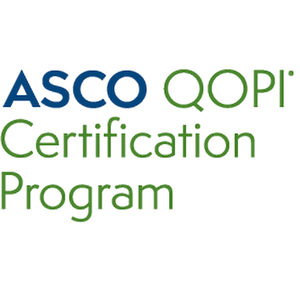Certification for High-Quality Cancer Care: QOPI
 Eisenhower Lucy Curci Cancer Center has been recognized by the QOPI® Certification Program, LLC, a wholly owned subsidiary of the Association for Clinical Oncology (the Association) and an affiliate of the American Society of Clinical Oncology (the Society), as successfully completing a three-year certification program for outpatient hematology-oncology practices that meet nationally recognized standards for quality cancer care. The QOPI Certification Program builds on the Society’s Quality Oncology Practice Initiative (QOPI).
Eisenhower Lucy Curci Cancer Center has been recognized by the QOPI® Certification Program, LLC, a wholly owned subsidiary of the Association for Clinical Oncology (the Association) and an affiliate of the American Society of Clinical Oncology (the Society), as successfully completing a three-year certification program for outpatient hematology-oncology practices that meet nationally recognized standards for quality cancer care. The QOPI Certification Program builds on the Society’s Quality Oncology Practice Initiative (QOPI).
Eisenhower Lucy Curci Cancer Center is the first in Riverside County to earn this prestigious certification for high-quality cancer care. In applying for certification, Eisenhower Lucy Curci Cancer Center participated in a voluntary comprehensive site assessment against clearly specified standards that are consistent with national guidelines and was successful in meeting the standards and objectives of the QOPI Certification Program.
QOPI is a voluntary self-assessment and improvement program launched by ASCO in 2006 to help hematology-oncology and medical oncology practices assess the quality of the care they provide to patients. Through QOPI, practices abstract data from patients’ records up to twice per year and enter this information into a secure database. More than 750 oncology practices have registered for QOPI.
The QOPI Certification Program, LLC was launched in January 2010, and nearly 300 practices are currently certified. This certification for outpatient oncology practices is the first program of its kind for oncology in the United States and in 2016 was expanded internationally. The QOPI Certification Program seal designates those practices that successfully met the standards and objectives of the QOPI Certification Program, which includes scoring above the threshold on the key QOPI quality measures and meeting chemotherapy safety standards established by the Society and the Oncology Nursing Society.
QOPI analyzes individual practice data and compares these to more than 170 evidence-based and consensus quality measures. The information is then provided in reports to participating practices. Individual practices also are able to compare their performance to data from other practices across the country. Based on this feedback, doctors and practices can identify areas for improvement.
To become QOPI Certified, practices have to submit to an evaluation of their entire practice and documentation standards. The QOPI Certification Program staff and committee members then verify through an on-site survey that the evaluation and documents are correct and that the practices met core standards in areas of treatment, including:
- Creating a safe environment — staffing, competencies, and general policy
- Treatment planning, patient consent, and education
- Ordering, preparing, dispensing, and administering chemotherapy
- Monitoring after chemotherapy is administered, including adherence, toxicity, and complications
- Treatment planning
- Staff training and education
- Chemotherapy orders and drug preparation
- Patient consent and education
- Safe chemotherapy administration
- Monitoring and assessment of patient well-being.
QOPI and the QOPI Certification Program are projects dedicated to innovative quality improvement programs. For more information, please visit asco.org.